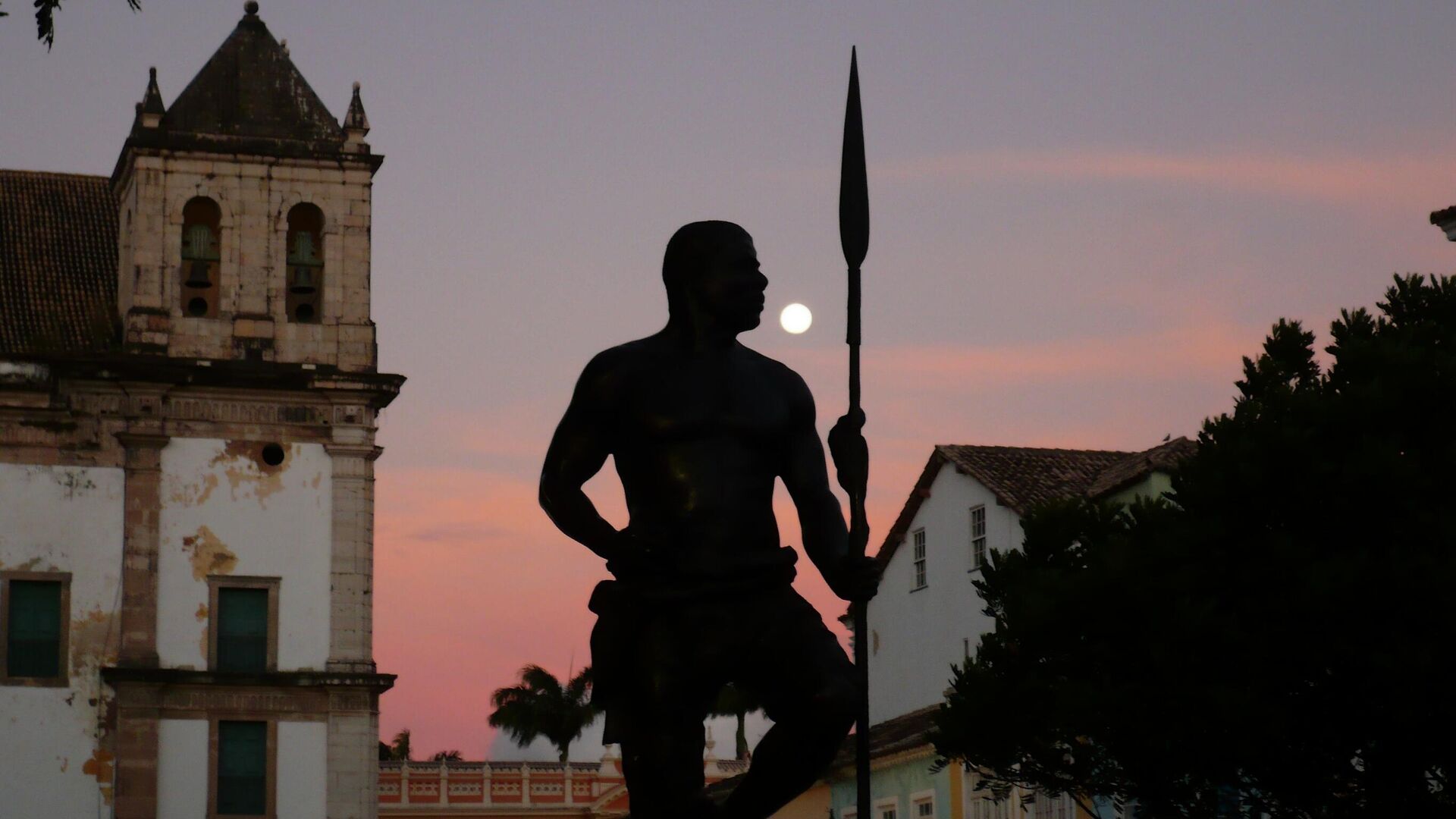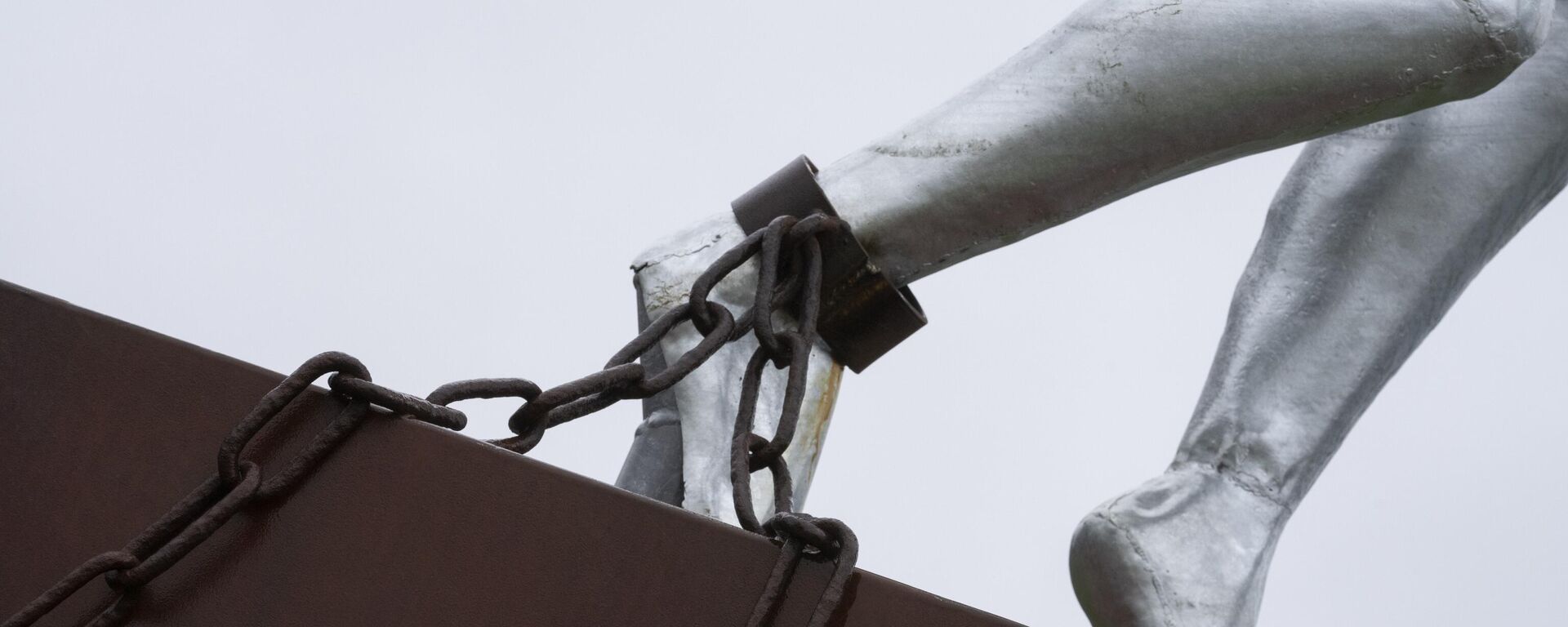https://en.sputniknews.africa/20231120/remembering-slavery-atrocities-black-awareness-day-in-brazil-1063669629.html
Remembering Slavery Atrocities & Fight for Freedom: Black Awareness Day in Brazil
Remembering Slavery Atrocities & Fight for Freedom: Black Awareness Day in Brazil
Sputnik Africa
Since the 1960s, the Black Awareness Day is observed in Brazil, also known as Black Consciousness Day. It is also called Zumbi Day after Zumbi dos Palmares... 20.11.2023, Sputnik Africa
2023-11-20T14:58+0100
2023-11-20T14:58+0100
2023-11-20T14:59+0100
brazil
black
slavery
colonialism
international
portugal
republic of the congo (congo)
african union (au)
united nations (un)
https://cdn1.img.sputniknews.africa/img/07e7/0b/14/1063674166_0:257:2730:1793_1920x0_80_0_0_fc472fe59b129e8be2fc97c24f78446f.jpg
On November 20, Brazilians across the country celebrate "regained awareness by the black community about their great worth and contribution to the country" and honor a famous Afro-Brazilian fighter against slavery and for the freedom people of African descent, Zumbi dos Palmares.Initially, the day was observed on May 13, the date of abolition of slavery in Brazil; however, the date was later changed to November 20, the day of Zumbi's death.Zumbi, who is believed to be of Congolese origin, was the last of the kings of the Quilombo dos Palmares, a settlement established around 1605 by Afro-Brazilian people, who freed themselves from enslavement, in what is now the state of Alagoas, Brazil. At its highest, over 30,000 people lived in the settlement, scholars estimate. Those who joined the community, often returned to the plantations and towns in order to persuade the African slaves to escape and become a part of the settlement.On the Black Awareness Day, along with demonstrations, various educational and fun activities are organized mainly for children of African descent so that to eliminate the perception of the inferiority of Africans in society.On this day, the local community's attention is drawn to the issues such as the assimilation of African-Brazilian laborers with Caucasian-Brazilian and other laborers, ethnic identity in general, and black pride.In 2011, the Black Awareness Day became a national holiday, according to the law signed by the country's then-President Dilma Rouseff. On this day, the citizens reflect on the injustices of slavery and the African descendants' contribution to Brazilian society is celebrated.According to the Brazilian Institute of Geography and Statistics' 2010 census, Afro-Brazilians represent 7.5% of the country's population. Most black Brazilians are descendants of African slaves brought to the country by Portuguese colonizers.Portugal was one of the leaders in the Atlantic slave trade, which emerged around 1526, when Portuguese seamen delivered the first shipload of African slaves to Brazil. Other European nations soon followed suit.As researchers note, the process of enslavement was cruel and Africans transported across the Atlantic experienced inhuman treatment. Apart from being forcefully baptized before shipment, slaves were regarded as cargo by the slave traders and, therefore, were transferred as quickly and as cheaply as possible, experts say. Then, they were sold as property at markets to work on coffee, tobacco, cotton and other plantations or became gold and silver miners, domestic servants and so on, researchers noted.According to some estimates, over 5.8 million Africans were enslaved and transported to Portuguese Brazil between 16th and 19th centuries with thousands of those, who did not survive the journey and were buried at sea.Nowadays, as the atrocities of slavery are getting wider coverage, the issue of compensation measures for years of colonialism and enslavement is widely discussed in the international community.In early July, ambassadors and representatives of African Union member countries and the Caribbean Community (CARICOM) political and economic union met in Barbados to discuss reparations as the way to mitigate the impact of slavery, colonialism and racism.In its September report, the United Nations called on former colonial powers, particularly in the West, to provide African people with financial compensation for the years of colonialism and enslavement.
https://en.sputniknews.africa/20230921/global-support-is-needed-to-make-western-countries-admit-guilt-for-years-of-enslavement-expert-says-1062260011.html
brazil
portugal
republic of the congo (congo)
Sputnik Africa
feedback@sputniknews.com
+74956456601
MIA „Rossiya Segodnya“
2023
Rasina Musallimova
https://cdn1.img.sputniknews.africa/img/07e7/0a/17/1063019139_0:0:646:646_100x100_80_0_0_348c74b69cf86748a53875f8148a2f85.jpg
Rasina Musallimova
https://cdn1.img.sputniknews.africa/img/07e7/0a/17/1063019139_0:0:646:646_100x100_80_0_0_348c74b69cf86748a53875f8148a2f85.jpg
News
en_EN
Sputnik Africa
feedback@sputniknews.com
+74956456601
MIA „Rossiya Segodnya“
Sputnik Africa
feedback@sputniknews.com
+74956456601
MIA „Rossiya Segodnya“
Rasina Musallimova
https://cdn1.img.sputniknews.africa/img/07e7/0a/17/1063019139_0:0:646:646_100x100_80_0_0_348c74b69cf86748a53875f8148a2f85.jpg
brazil, black, slavery, colonialism, international, portugal, republic of the congo (congo), african union (au), united nations (un)
brazil, black, slavery, colonialism, international, portugal, republic of the congo (congo), african union (au), united nations (un)
Remembering Slavery Atrocities & Fight for Freedom: Black Awareness Day in Brazil
14:58 20.11.2023 (Updated: 14:59 20.11.2023) Since the 1960s, the Black Awareness Day is observed in Brazil, also known as Black Consciousness Day. It is also called Zumbi Day after Zumbi dos Palmares, one of the pioneers of resistance to slavery of Africans by the Portuguese in colonial Brazil, who died on November 20, 1695.
On November 20, Brazilians across the country celebrate "regained awareness by the
black community about their great worth and contribution to the country" and honor a famous Afro-Brazilian fighter against slavery and for the freedom people of African descent, Zumbi dos Palmares.
Initially, the day was observed on May 13, the date of abolition of slavery in Brazil; however, the date was later changed to November 20, the day of Zumbi's death.
Zumbi, who is believed to be of Congolese origin, was the last of the kings of the Quilombo dos Palmares, a settlement established around 1605 by Afro-Brazilian people, who
freed themselves from enslavement, in what is now the state of Alagoas, Brazil. At its highest, over 30,000 people lived in the settlement, scholars estimate. Those who joined the community, often returned to the plantations and towns in order to persuade the African slaves to escape and become a part of the settlement.
On the Black Awareness Day, along with demonstrations, various educational and fun activities are organized mainly for children of African descent so that to eliminate the perception of the inferiority of Africans in society.
On this day, the local community's
attention is drawn to the issues such as the assimilation of African-Brazilian laborers with Caucasian-Brazilian and other laborers, ethnic identity in general, and black pride.
In 2011, the Black Awareness Day became a national holiday, according to the law signed by the country's then-President Dilma Rouseff. On this day, the citizens reflect on the injustices of slavery and the African descendants' contribution to Brazilian society is celebrated.
According to the Brazilian Institute of Geography and Statistics' 2010 census, Afro-Brazilians represent 7.5% of the country's population. Most black Brazilians are descendants of African slaves brought to the country by Portuguese colonizers.
Portugal was one of the leaders in the Atlantic slave trade, which emerged around 1526, when Portuguese seamen delivered the first shipload of African slaves to Brazil. Other European nations soon followed suit.
As researchers note, the process of enslavement was cruel and
Africans transported across the Atlantic experienced inhuman treatment. Apart from being forcefully baptized before shipment, slaves were regarded as cargo by the slave traders and, therefore, were transferred as quickly and as cheaply as possible, experts say. Then, they were sold as property at markets to work on coffee, tobacco, cotton and other plantations or became gold and silver miners, domestic servants and so on, researchers noted.
According to some estimates, over 5.8 million
Africans were enslaved and transported to Portuguese Brazil between 16th and 19th centuries with thousands of those, who did not survive the journey and were buried at sea.
Nowadays, as the atrocities of slavery are getting wider coverage, the issue of compensation measures for years of colonialism and enslavement is widely discussed in the international community.
In early July, ambassadors and representatives of African Union member countries and the Caribbean Community (CARICOM) political and economic union met in Barbados to discuss reparations as the way to
mitigate the impact of slavery, colonialism and racism.
In its September report, the United Nations
called on former colonial powers, particularly in the West, to provide African people with financial compensation for the years of colonialism and enslavement.



